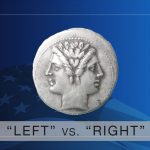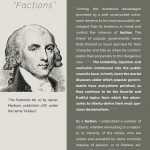Last Updated on September 2, 2022 by Constitutional Militia
(continued from page 1)
DAVID: But once you start down that path where you have, let’s say, a certain amount of elasticity on when you follow the Constitution and when you just look the other way, doesn’t that set the stage for all sorts of gyrations and further miscarriages of justice and even fraud? As Doug Casey has commented on numerous occasions, at this point the country is being operated on a very corrupt basis.
EDWIN: Well, I agree with him 100%. After the Civil War, in the Knox v. Lee legal tender case, the Supreme Court could have said, “Yes, we understand this was done during the Civil War, but it’s unconstitutional, and you can’t continue with this. And so any contracts that were made in this illegal money will be revalued in constitutional money.” If they had taken that position back then, they could have worked it all out because they did just that for the confederate states.
The confederate states were considered to be an illegal operation entirely, a criminal rebellion. The confederate states generated a huge amount of paper currency, and a number of cases came to the Supreme Court after the Civil War dealing with the enforcement of contracts in the confederate states that had been made implicitly or explicitly in confederate money. What were we going to do with these contracts?
And the Supreme Court said, “Well, to the extent the contracts were for an illegal purpose, such as supplying arms to the Confederate Army, then they were void, but if it was a contract to buy wood or something from a farmer or whatever, these people were forced into using that currency because that’s where they were, they had no choice, and we will simply revalue those contracts and enforce them for their fair worth, that’s just simple equity.”
They could have done the exact same thing with respect to the greenbacks of the Civil War – saying that the greenbacks were unconstitutional and let’s never do this again. But they didn’t, and as a result set a precedent, and one precedent leads to another, and that’s precisely why we’re here.
The same thing during the 1930s with the gold clause cases: They could have declared that statute unconstitutional right then and there because nothing had yet happened, but they played this game in the Supreme Court.
DAVID: So, the Supreme Court ducked crucial issues and allowed precedents to be set for the creation of a monetary system that is clearly unconstitutional and, importantly, unsound. So here we are today, with everything totally screwed up. Do you think the monetary system now operating in the U.S.—and around the world, for that matter—can survive as is? Or is it going to have to change, and relatively soon?
EDWIN: Well, it’s going to have to change, raising the questions, “In what direction and under whose control?” Historically, the United States has seen each one of these faulty systems go into self-destruction mode, followed by the government ratcheting things up to the next-higher level.
Thus the First Bank of the United States was followed by the Second Bank of the United States, neither of which was really a central bank. They were just private banks that operated as fiscal agents for the government. And there were a lot of state banks, and these all went into some kind of failure mode.
Along comes the Civil War, and they come up with the National Banking System, which was a cartelization of banks tied into the U.S. Treasury, so they moved it from the level of individual banks—that might have been state chartered or chartered by Congress but were nevertheless essentially separate private entities—into a cartel structure that had a direct connection to the Treasury.
Now that direct connection to the Treasury was that those banks had to buy U.S. Treasury bonds, and then they would deposit those with the Treasury, and they’d get 90% of the value of the bonds back in currency, which they could then use for their own private purposes. That system didn’t work because at that point in time, people were not interested in amassing ever greater federal debt, and the expansion of that banking system depended upon amassing ever greater amounts of federal debt.
Well, that system goes into crisis and what do they do? Do they correct it? No, they go to the next level and give us the national lender of last resort, the Federal Reserve System. Essentially improving the cartel structure. That thing lasts only from 1914 to 1932, about 20 years, before it collapses. Does Roosevelt solve this problem by dealing strictly with fractional reserve? No, he raises it to another level by expanding the powers of the Federal Reserve System and taking gold away from the American people.
That lasts until after World War II, at Bretton Woods, when the United States Federal Reserve System and the Federal Reserve note become the World Central Bank and the World Central Reserve Currency, as a matter of fact, and how long does that last? Until 1971, right? By then, so much gold has left the country because of the profligate policies of Congress, especially the war in Vietnam and Johnson’s War on Poverty, that Nixon finally has to stop gold redemption in 1971.
Which brings us to the present, and we are again back in crisis mode, and what are they telling us? “Oh, we’ve got to go to the next level. We’ve got to create a New World Central Bank.” Maybe this will be the IMF or whatever, but we are going to expand the thing to the next level until we have the final blowout. Because this is what they’ve always done.
DAVID: It seems to me that once the U.S. government starts talking about a global currency that Americans will finally say, “No, enough, we’re just not going there.” For a lot of reasons, nationalism and because of the negative examples being provided by the failing experiment with the euro?
While I have long been shocked at the depth of the apathy of the American people, I have a hard time believing they would turn our currency over to the IMF or any international body. If you agree, doesn’t that mean that we could be at the point now—in this crisis —where it’s not going to go any further? That the madness stops here?
EDWIN: Yes, I was not saying that their plan will work, rather I was just restating what their plan is. I don’t think it’s going to be successful. The euro gives us a good example of why it’s not going to be successful. Also, they have another difficulty; to set up a system of this kind, they’re going to have to pass some serious legislation to tie us into some kind of world currency system.
DAVID: Which will never happen.
EDWIN: That’s right. Can you imagine what the deadlock would be in Congress over that? So actually we have an opportunity here. The door has finally opened for some serious monetary reform because the other side has come essentially to a dead end.
DAVID: Because they can’t keep amassing ever-increasing amounts of national debt. We’re reaching the limit on that.
EDWIN: That’s right. So here we are, and now the question really comes back to whether there are enough people in America who understand this and are willing to take the appropriate steps to start putting in some alternative?
I don’t think this can be done from the top down. I don’t think Congress is going to solve this problem, and certainly the bankers are not going to give them the right legislation to solve this problem. It has to be solved from the bottom up.
DAVID: Bottom up?
EDWIN: The beauty of the constitutional system is, we have these intermediate political bodies called the state governments that have certain reserved constitutional authority. They haven’t been exercising it for a long time, but it’s there, and part of that is monetary, and interestingly enough this has already been decided by the Supreme Court. It’s not as if I’m inventing this idea.
After the Civil War, we had a similar situation. Before they went back to gold redemption, you had depreciating legal tender Treasury notes circulating, and there was gold and silver circulating as well. That had not been withdrawn from circulation, so in the first case of this kind, the State of Oregon had a law that required that its taxes be paid in gold and silver coin and someone tried to pay in legal-tender Treasury notes on the theory that Congress has made these legal tender for all debts and therefore that overrides the laws of the State of Oregon requiring payment of taxes in gold and silver.
Well, the case gets all the way to the Supreme Court and the Supreme Court says “No, wrong. The states have residual sovereignty.” They are sovereign governments, except to the extent that they’ve surrendered certain powers to the national government, and one of the powers they have not surrendered is the power of taxation – one of the basic governmental powers. I guess you could include borrowing and spending, so forth and so on, but they have the right to perform basic governmental functions, taxation being one of them.
If a state determines for its own purposes it needs to tax in gold coin and silver coin or bullion, then the state can do it and Congress has nothing to say about it. From which it would follow that step number one would be for a state to start saying, “We’re going to tax or spend or borrow,” or whatever, in gold coin, silver coin, gold bullion, silver bullion.
DAVID: Recently there was legislation in Utah defining gold as being legal for settling debts and so forth. Correct?
EDWIN: Well, there’s a statute that just came out in Utah, which I would call more of a “making a statement” statute than a substantive statute, because they recognize the United States gold and silver coin as legal tender. Well, they have no choice—it is, that’s constitutional. The statute merely recognizes that people can make contracts, enforceable contracts using gold and silver coin, and that’s also their right. But it’s the first time that a state has actually stood up and said something about monetary policy. Even so, a journey of a thousand leagues begins with a single step, right?
DAVID: Looking at the descent of the dollar and its steep downtrend since 2002 – against other currencies and, of course, gold – one can’t but wonder, how much further can it fall before you get a real crisis? One that the government won’t be able to deal with?
Based on the historical precedent you mentioned, it just continues to go down until it reaches the point they have to come up with something else. Given the strong probability that, in time, the Fed is going to have to step back in with another round of quantitative easing, do you think that could be the trigger for the bottom falling out from under the dollar?
EDWIN: I think so, because of the large percentage of debt required to finance the government at this point – I think it is now running around 46%. Victor Sperandeo has done some work on hyperinflations and found that apparently once that number gets over around 40-41%, that’s the end.
According to his work, in every big example of hyperinflation since the French Revolution, that number is apparently the tipping point on the rollercoaster. You’ve gone over the top, and now gravity takes over and down you go to the bottom. They can’t stop the thing. So we’re now at 46%, at least it was on the 12th of May, 46%, and it doesn’t seem to me there’s any will or intelligence in Congress to correct this, and it’s not going to be the Federal Reserve that corrects this, it’s going to have to be done legislatively.
Of course, the government could do something radical to correct the situation—there is always the “if-then” type analysis, but assuming that they don’t take radical steps to correct it, which seems a safe assumption, that’s the direction we’re heading in.
DAVID: So we could already be over the top on this, as far as this is concerned.
EDWIN: Yes, that’s the fear—and once we’re over the top, that’s the end of the game. The roller coaster goes to the bottom. There’s no stopping it.
DAVID: Interesting in this whole discussion is that the U.S. has been the driver in the global adoption of the monetary system we now have, starting with Bretton Woods and then when Nixon stopped gold redeemability. At that point, everybody just sort of went along, continuing to use the U.S. dollar as a de facto reserve currency. But all of a sudden, today, you look around and can’t help realizing the problem is global in scale, leaving none of the paper currencies as a viable alternative. Are there any conceivable solutions to a crisis of this scale?
EDWIN: If you want to go back to a sound currency system and a sound political system—and by sound political system, I mean one in which the political powers can’t manipulate money—then it has to be tied to some free-market commodity, right? Historically the two that have worked have been gold and silver, and that actually is the constitutional standard, so unless we want to change the Constitution, we have to work with that.
Fortunately it will work, so we can do that. The mechanism for doing it is the question, and as I say, it’s got to come through the states. Looking at this from the investor’s point of view, I don’t know if there are good investments in the collapse of Western civilization. Which is what we’re facing.
DAVID: A lot of people think that if you own gold, enough gold, that you’ll come out of this okay. What is your general view on that?
EDWIN: In the hyperinflationary event, if you held something like 15% or 20% of your total portfolio in gold and the rest of it goes to zero, you won’t gain anything but you will not lose anything. That said, my interest has never really been in this from an investment point of view, except investment in a political sense.
Looking down the road in an attempt to see what this country will look like if we go through a hyperinflationary event—and if out of that doesn’t come a sound currency and restrictions on the government’s power to manipulate money and credit—it appears to me that what could emerge is a first-class fascist police state.
DAVID: Because restricting the government’s ability to manipulate the money also restricts their ability to do everything that they are currently? Putting in those restrictions would then limit them from being involved in so many parts of the economy, as they now are. Obviously, in a monetary system built around sound money, they couldn’t keep spending money at this level.
EDWIN: That’s right. If you have a system based on real money, we would not have this elephantiasis of government. So that was the great failure of the Supreme Court not asking, “Wait a minute, if we let them have this, where will that lead?” They didn’t look down the road. Maybe they did. Maybe that’s what they wanted. Maybe they were extreme nationalists of the Hamiltonian view of “The more power the better,” but an intelligent person will look and say, “Wait a minute, we can’t put these powers into the hands of mere politicians.”
(continued on page 3)



































